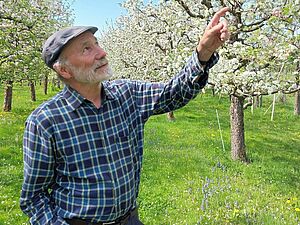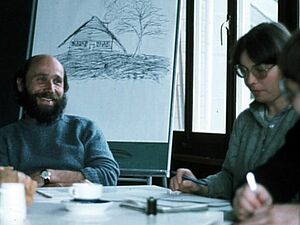"My aim was to combine theory with practice"
50th anniversary voices
Otto Schmid has been "on board" at FiBL since 1977. He is a long-standing organic advisor, researcher, and expert on organic standards.
My connection with FiBL
Thanks to FiBL, I was able to tackle exciting fields of action. My aim was to make a positive difference in the future and to combine theory with practice. That was and is possible for me at FiBL. In April 1977, with three years grant from WWF Switzerland, I started as an organic advisor at FiBL and developed and expanded the advisory service. In this capacity, I became involved early on in the development of organic farming standards and was president of the supervisory committee of the Association of Swiss Organic Farming Organisations (VSBLO, later Bio Suisse), which issued the first common standards in 1980. As interim head of FiBL (before Urs Niggli took over in May 1990), I had a key experience in the Federal Parliament: on the morning before the parliamentary vote on the agricultural budget in December 1989, with the support of two National Councillors, we managed to secure one million Swiss francs from the federal government for research at FiBL. In 1990 I moved to FiBL research and initiated the socio-economic research group with a main focus on business management and the market. From 1998 onwards, I was involved as a FiBL researcher in numerous EU research projects, mostly related to the EU organic regulation and organic marketing.
What FiBL and I have achieved together
I am proud that, with the support of various FiBL experts, I contributed significantly to developing common organic standards in Switzerland and the standards of the International Federation of Organic Agriculture Movements IFOAM (for 9 years as coordinator of the standards committee). As a FiBL expert, I taught organic agriculture (1988 to 2021) and agricultural marketing (2008 to 2016) at universities and was able to give and receive many impulses. Together with Urs Niggli, I lobbied for organic research in Brussels, first through the IFOAM EU group and then through TP Organics (European Technology Platform for organic food & farming). This was successful: research for and about organic agriculture was included in EU research programmes. FiBL and organic agriculture continue to benefit from this to this day. As a member of various expert groups and working groups, I have provided an impetus for further developing genuinely sustainable food systems. During my career at FiBL, I went from being an agricultural advisor to a policy advisor.
My wish for the future is that FiBL...
...remains true to the basic principles of organic farming (Health, Ecology, Fairness, and care).
...supports organic farmers and processors with improved instruments to develop their farms more sustainably on their own.
... is looking for ways with the organic organisations to reduce the guidelines to the essentials but not to water them down. Instead of prescribing measures down to the last detail, the result would be decisive.
... is attractive to young people, for example, through a strong focus on consistent agroecological system approaches, regenerative soil management and/or integrated agroforestry systems with extensive animal husbandry.
This is what I give FiBL for the next 50 years
I think it is important that, despite FiBL's size, the human element is not neglected and that a culture of appreciation and recognition continues to be cultivated in the future. In addition, the unique potential of transdisciplinary networking research-advice-practice-consumption across the entire food chain must be cultivated by FiBL.





